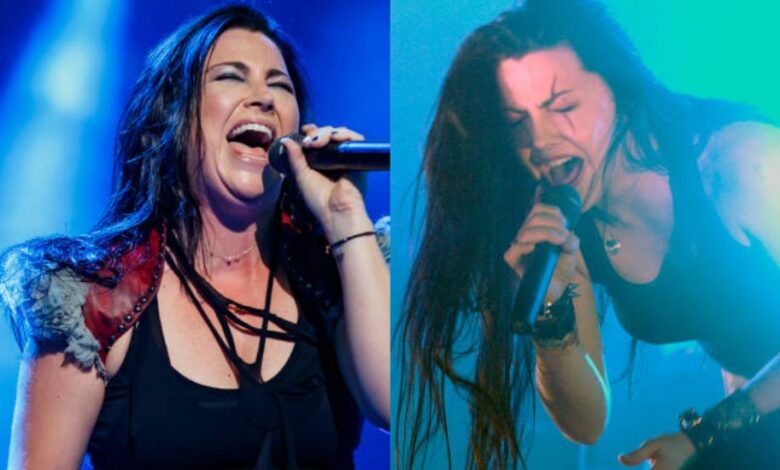Amy Lee Singer: The Voice Behind Evanescence’s Timeless Sound

Introduction
When people hear the name Amy Lee, they often think of soaring vocals, gothic elegance, and a musical style that blends raw emotion with symphonic grandeur. As the co-founder and lead singer of the American rock band Evanescence, Amy Lee has built a career that transcends decades, genres, and trends. With her haunting voice and piano-driven compositions, she has become a cultural icon—not just in alternative rock but across the wider landscape of popular music.
This article explores Amy Lee’s life, career, artistry, and influence, offering a comprehensive look at one of rock’s most enduring and respected voices.
Early Life and Musical Roots
Amy Lynn Lee was born on December 13, 1981, in Riverside, California. The daughter of John Lee (a disc jockey and television personality) and Sara Cargill, Amy grew up in a musically rich environment. Tragically, her younger sister died in early childhood, a loss that deeply influenced Amy’s writing style and lyrical depth later on.
The Lee family moved frequently—living in California, Florida, and Illinois before settling in Little Rock, Arkansas. It was here that Amy began to flourish musically, studying classical piano for nine years and finding inspiration in both classical composers like Mozart and Beethoven and modern alternative voices like Björk, Tori Amos, and Danny Elfman.
Her classical training provided a strong foundation, which she later fused with gothic and rock elements to create Evanescence’s signature sound.
The Formation of Evanescence
Amy Lee co-founded Evanescence in the mid-1990s with guitarist Ben Moody, whom she met at a youth camp. The duo started writing music together and distributing early demos. Over time, the project evolved into a full band.
In 2003, Evanescence released their debut album, Fallen, which became a cultural phenomenon. Featuring songs like Bring Me to Life and My Immortal, the album sold over 17 million copies worldwide, cementing Amy Lee as a household name. The record won multiple Grammy Awards, including Best New Artist, and introduced the world to a unique blend of alternative metal, symphonic rock, and emotional balladry.
Amy Lee’s Distinctive Voice and Style
Amy’s voice has often been described as ethereal yet powerful, with a range that moves seamlessly from delicate whispers to operatic crescendos. Unlike many of her contemporaries, she combines technical precision with raw emotional delivery, creating performances that feel both polished and vulnerable.
Her fashion sense also contributed to her iconic status. Lee often designs or co-designs her own stage costumes, drawing from gothic, Victorian, and fantasy aesthetics. Her visual presentation reinforces the otherworldly qualities of her music, making her not just a singer but a full-fledged artistic persona.
Overcoming Industry Pressures
One of the defining moments of Amy Lee’s career came with the hit Bring MAmy Winehouse’so Life. While the song became a global success, Amy has spoken openly about her discomfort with the rap interlude added under record label pressure. In later years, she reclaimed the song by performing it as she originally intended—without the rap verse—asserting her creative vision.
This example reflects Amy’s broader relationship with the music industry. She has consistently pushed back against being boxed into trends or labels, insisting on staying true to her artistry. This independence has helped Evanescence maintain a distinctive identity across decades.
Beyond Evanescence: Solo Work and Collaborations
While Evanescence remains her primary platform, Amy Lee has explored solo projects and collaborations:
- Film Scores: She has composed pieces for films like War Story and contributed to Voice from the Stone.
- Children’s Music: In 2016, Amy released Dream Too Much, a family-friendly album inspired by her son Jack.
- Collaborations: Lee has worked with artists across genres, from Seether (the hit Broken) to violinist Lindsey Stirling (Love Goes On and On).
These projects highlight her versatility, proving she can thrive outside the framework of Evanescence.
The Bitter Truth and Modern Era
After several lineup changes and a decade-long gap between original material, Evanescence returned with The Bitter Truth in 2021. The album combined the band’s classic sound with modern influences, tackling themes of grief, resilience, and empowerment.
For Amy, the album was personal. It reflected her journey through the loss of her brother, the challenges of motherhood, and the resilience required to remain an artist in a rapidly shifting industry. Critics praised the record for staying true to the Evanescence sound while evolving with contemporary production styles.
Influence and Legacy
Amy Lee’s influence extends beyond her music:
- Women in Rock: She helped pave the way for female-fronted rock and metal acts in the 2000s. Bands like Halestorm and Within Temptation often cite Evanescence as an influence.
- Genre Blending: Lee popularized the fusion of symphonic and gothic elements with mainstream rock.
- Authenticity: Her openness about grief, trauma, and personal struggles resonates with fans, making her a relatable figure despite her fame.
Her legacy is not just in record sales but in the emotional connections she has formed with millions of listeners worldwide.
Amy Lee Compared with Other Singers Named “Amy”
Since your requested keywords also reference other singers named Amy, here’s a quick comparison:
- Amy Macdonald: A Scottish singer-songwriter best known for folk-pop hits like This Is the Life. While musically different from Lee, both artists are known for lyrical authenticity.
- Amy Studt: A British pop-rock singer from the early 2000s, recently staging a comeback. Like Lee, she blends vulnerability with strong melodic writing.
- Singers similar to Amy Winehouse: While Amy Lee is not a soul-jazz singer like Winehouse, both women share a reputation for emotionally charged, deeply personal performances.
This broader perspective highlights how Amy Lee fits into a larger cultural tapestry of powerful female voices.
Personal Life
Amy married therapist Josh Hartzler in 2007, and they have a son, Jack, born in 2014. She has spoken about balancing motherhood with her career, noting that her family inspires much of her creativity.
Her private life contrasts with the darker, often intense themes of her music, offering her stability and grounding.
Amy Lee’s Continuing Impact
As of today, Amy Lee continues to tour globally, record new music, and inspire both fans and fellow musicians. The 20th-anniversary reissue of Fallen reignited interest in Evanescence’s early work, introducing her music to a new generation of listeners.
Her ability to evolve while maintaining artistic integrity makes her one of the rare artists who appeal across decades. Whether as a gothic icon, a rock frontwoman, or a solo artist, Amy Lee’s presence remains as powerful as ever.
Conclusion
Amy Lee is more than just the singer of Evanescence—she is a symbol of resilience, artistry, and authenticity. From her classical roots to her international stardom, she has built a career defined by passion and independence. Her voice continues to echo across generations, reminding listeners of the emotional power music can hold.
For fans seeking to understand the depth of Amy Lee’s artistry, her story is one of triumph over adversity, creative defiance, and a commitment to authenticity. She is a singer who has never been afraid to be different, and in doing so, she has created a legacy that will endure.
Written for readers by Infizo.



